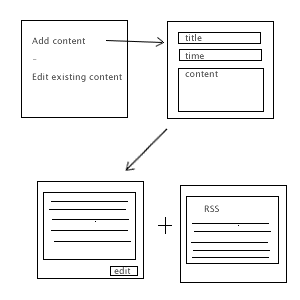Alrighty, so am thinking about this a bit more.
What I would like, I reckon, is a wiki app which worked a bit like this:
1. User (registered or unregistered, ‘spose you can always build it Captcha / spam blocking to sort this) comes along to enter info
2. Info form consiste of a.Title b.Time (default to now but changeable) c. content (which can include images, audio etc.)
3. User enters info and submits, this lot of info has RSS version and presentable form all to itself. It’s a discrete chunk of information but still wiki-editable (i.e. by other people)
4. This chunk is then stored in a big bucket with all the other chunks which can be browsed, searched or pulled into particular areas by the title (but we’ll worry about that later). The main thing is that it lives with all the other chunks in a nice pure RSS & viewable form where it can still be changed and we can then do stuff to it.
Now… the first thing that jumps to mind here is the WordPress ‘page’ creator (you can see how that works if you have an IncSub Blog) , it creates exactly the content I’m talking about, gives it an RSS version (I think) and drops it in a place called ‘pages’… but while you can register and then post pages on a WP blog pretty easily, it’s still no wiki (and the chunks aren’t editble). So that’s out.
I know this looks a bit simple but from a basic perspective this is what I want… no linking, WikiLanguage (apart from formatting… if I have to) or anything particularly fancy… just a chunk creator, a place full of chunks (preferably with a basic list so that they’re easily browsable first up), chunks each having discrete RSS versions and chunks remaining editable.
I guess I want RSS because I know what it is and these can then be happily syndicated.

